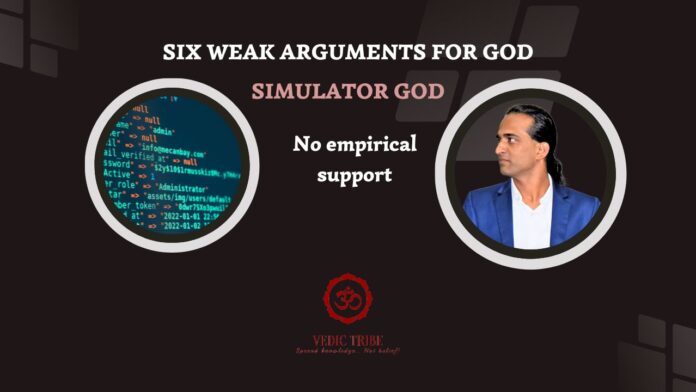Is the world a simulation?
In the previous article, we discussed the third weak argument for God – “Intelligent Designer God” and in this article, we will discuss the third weak argument – “Simulator God”.
The “Simulator God” hypothesis proposes that the universe we perceive is a computer simulation created by a more advanced intelligence – often suggesting the God.
The Core Idea:
Inspiration from Video Games: This idea draws inspiration from the increasing sophistication of video games, where simulated worlds become increasingly realistic.
The Anthropic Principle: The hypothesis often invokes the anthropic principle, which suggests that the universe seems finely tuned for the emergence of life, particularly human life.This fine-tuning, some argue, could be a feature of a simulated environment designed for our benefit.
Theistic interpretations:
The observation that the universe appears finely-tuned for the emergence of life, a key tenet of the Anthropic Principle, strengthens the speculation of – universe being a simulation to accommodate sentient being like ourselves.
This argument posits that the intricate balance of fundamental constants and forces in the universe suggests an intelligent designer or a simulator , often identified with God.
God as the Ultimate Programmer: This view sees God as the supreme intelligence behind the simulation, the ultimate programmer who created the universe and its laws. This aligns with traditional theistic concepts of God as the creator.
God as the Architect of Reality: This perspective views God as the architect of the simulated reality, not necessarily as a programmer in the traditional sense. God, in this view, establishes the fundamental rules and parameters of the simulation, allowing for the emergence of consciousness and the unfolding of human history.
God as the Shepherd of Souls: This interpretation suggests that God interacts with the simulated world, guiding and interacting with the simulated beings within it. This could involve divine intervention, miracles, or the inspiration of religious and spiritual experiences.
Arguments Against the Simulator God Hypothesis:
Limited Scope of the Anthropic Principle: The anthropic principle, while intriguing, has a limited explanatory power. Atheists argue that the universe’s properties are shaped by fundamental laws of physics and cosmology, not by a conscious designer or a simulator
Lack of Evidence: There is no empirical evidence to support the existence of a simulation. If reality were a simulation, there might be limitations in the resolution or precision of the simulation, leading to observable artifacts.
The “Who Created the Simulator?” Question: If our universe is a simulation, who created the simulators? This leads to an infinite regress, raising more questions than it answers.
Concerns about Anthropomorphism: Attributing human-like qualities such as “simulation” to the divine can be seen as anthropomorphic, projecting human concepts onto a transcendent reality.
The Vedic Perspective – Dharma:
Dharma – the way of things: The concept of “dharma” is loosely translated as religion. But it encapsulates a larger spectrum of ideas. One such idea signifies the inherent nature, essence, or function of a particular entity. For example, the “dharma” of fire is to burn.
Natural explanation: Similarly, one of the “dharma” of the almighty is to create, sustain and dissolve the cosmos. The process is not just an intelligent intervention but it is an act of the almighty’s inherent joy. This is visible in nature – as the bird’s singing is not always for a purpose. Birds do sing just to express joy.
No anthropic idea: Vedic wisdom do not accept the idea that the world exists solely or primarily for human benefit or as a kind of test or simulation. Instead, the world is inhabited by infinite number of conscious beings at different levels of existence. Humans are a miniscule being in the vast array of conscious beings explained in Vedic literature. This perspective moves away from the idea that humans are the centre of the universe or the sole purpose of creation.
Expression of Joy: In Vedic wisdom, there is no need for the almighty to simulate the world for human’s experience. Rather the almighty’s creation is a product of expression of its inherent joy. This highlights the idea that creation is an outpouring of the divine’s nature, similar to how an artist expresses their creativity through their work. The concept of Ananda in Vedic philosophy, which is often described as the blissful joy that is inherent in Brahman, the ultimate reality. Like a child engrossed in blissful joy creates & destroys things, Brahman creates & destroys the cosmos.
By observing the creation of almighty, we ourselves can invoke the inherent joy within us and experience the bliss for eternity.
Conclusion:
The “Simulator God” hypothesis is a fascinating thought experiment, but it remains speculative. It raises profound questions about the nature of reality, but lacks empirical support.
Vedanta, with its focus on apparent play of the almighty, offers a different framework for understanding our place in the universe, one that transcends the limitations of scientific and philosophical speculation about the ultimate nature of reality.
In our next article, we will discuss the fifth weak argument for God: “Spinoza’s God”
Madhwesh K
Vedic Tribe

